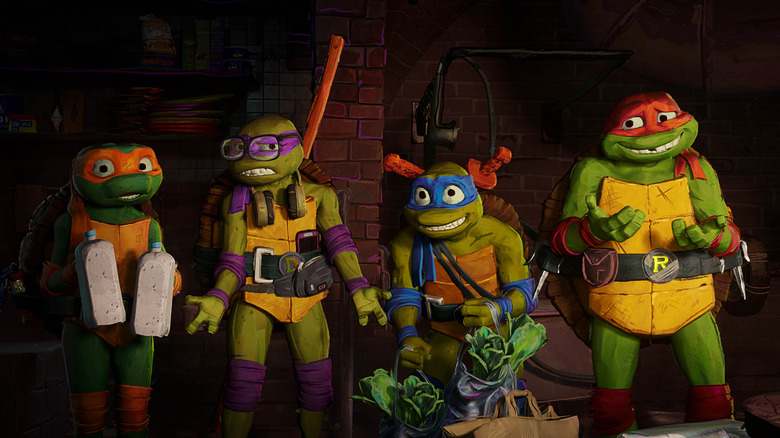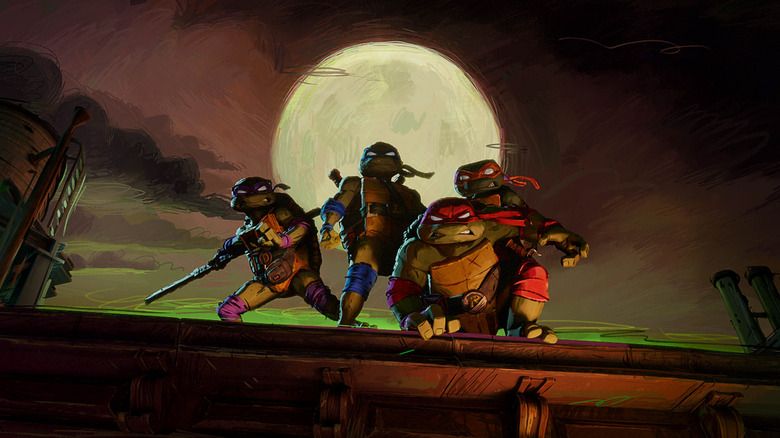The Teenage Mutant Ninja Turtles Were Censored In The UK Over One Word
Conservatives are quick to decry "cancel culture" these days, even though it's less "canceling" and more "facing consequences for harmful actions." And besides, it's not like so-called cancel culture is anything new. Over the decades, there have been numerous campaigns to censor content, many of which came from conservative politicians and ideologues. Even "Teenage Mutant Ninja Turtles" wasn't immune.
The late 1980s and early '90s were a period of moral panic in the United Kingdom during Margaret Thatcher's conservative reign as Prime Minister. This led to many instances of censorship, including changing the name of "Teenage Mutant Ninja Turtles" to "Teenage Mutant Hero Turtles." It seems like a silly change (and it was), but many kids who grew up in the U.K. at the time may remember this branding.
Tribune detailed what transpired in the country at this time. There was a great deal of moral panic, primarily around bloody horror movies and content depicting ninja weaponry and martial arts. This dates back to 1986 when the Martial Arts Commission published guidelines asking those who sold martial arts equipment not to sell to minors. Stricter laws followed, including the Criminal Justice Act 1988 (Offensive Weapons) Order 1988, which banned the sale of 14 ninja-style weapons for anyone, including handclaws, swordsticks, knuckledusters, and shurikens. Naturally, the panic made its way to media, with films and TV shows depicting martial arts or ninja weaponry facing heavy censorship. And it didn't take long for the "Teenage Mutant Hero Turtles" to become public enemy number one.
Ninjas can be heroes, too
The cartoon "Teenage Mutant Ninja Turtles" came out on BBC1 in 1990, when the moral panic surrounding anything affiliated with ninja weapons was in full swing. The title change impacted the show and any merchandising associated with it. But that wasn't the only change made to the animated series. Despite Michelangelo's primary weapon being nunchucks, it was changed to a grappling hook for the show. Additionally, numerous stories emerged during this time of the show's "negative" influence on the nation's youth. For example, one story reported how youngsters needed to be rescued from the sewers because they wanted to imitate the titular turtles.
The "TMNT" movies also didn't escape censorship. The first film, which came out in 1990, was able to retain its original name, but many scenes were altered for U.K. audiences. The Guardian ran a story of just how significant it was, reporting, "Richard Falcon cited as complainants his nephews, aged nine and 12, who thought the film had been ruined and no longer matched their collecting cards showing scenes from the film." Arguably the funniest case of censorship came with the sequel, "The Secret of the Ooze." The original cut had a scene with Mikey using sausages in a nunchuck-esque way. This resulted in the following amusing note from censors: "Reduce to minimum dazzling display of swinging sausages indistinguishable from chainsticks."
Before Americans look their noses down at the U.K., the Turtles faced some censorship in the States, too. The Los Angeles Times reported how "TMNT" clothing was banned at some daycares because they worried about kids karate-chopping each other. At least now, everyone can enjoy the franchise, including "Teenage Mutant Ninja Turtles: Mutant Mayhem," without the government butting in.

